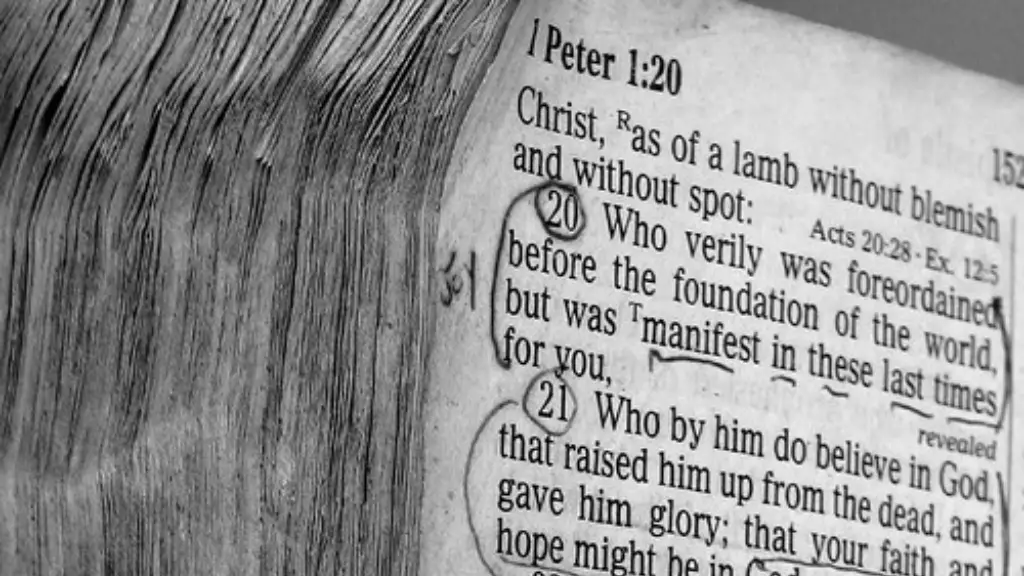The Definition Of The Chronological Order Of The Bible
The chronological order of the Bible is a way of organizing its texts according to their chronology, or the order in which they were written, rather than their traditional topic or contents. In the chronological order, readers view the history of the Bible in the sequence it was written. This means that, for example, the stories of Abraham’s ancestry come before the Israelites’ exodus from Egypt and the ministry of Moses.
A Historical Study Of The Bible In Chronological Order
The concept of arranging the text of the Bible chronologically is not a modern one. As early as 1704, Christian scholars began recognizing the need to study the Bible in chronological order rather than the traditional topic based pattern. This movement was accelerated by several European scholars in the 17-19th centuries and eventually accepted by mainstream religious scholars.
The Benefits Of Chronological Bible Study
Studying the Bible chronologically has its benefits. In chronological order, the events are seen in their actual date order, allowing for a great level of detail and understanding that is not allowed when the Bible is read based on its topic. Chronological Bible study also combines factual information from both the Old and New Testaments, allowing readers to gain a fuller understanding of the Word of God.
The Variety Of Chronological Bible Study Methodologies
Today, there are a variety of different chronological Bible study methodologies that can be used. Different approaches to chronological Bible study will focus on different aspects, such as historical timeframes or literary timeframes. It is important for Bible students to choose a method of chronological Bible study that fits their needs and abilities.
How To Approach Chronological Bible Study
When undertaking a chronological Bible study, there are a few important steps that need to be taken. First, it is important to research the timeline of events in the Bible in order to gain a better understanding of the chronological order. Additionally, it is important to read the entire Bible in its chronological order to get a better understanding of the connection between its texts.
The Role Of Biblical Archaeology In The Chronological Order Of The Bible
Biblical Archaeology plays an important role in helping Bible students gain a deeper understanding of the chronology of the Bible. By uncovering artifacts from different eras and cultures, archaeologists are able to paint a better picture of the time in which each of these events took place. This allows Bible students to better understand the context in which many of these stories occurred.
The Impact Of Chronicling On Biblical Interpretation
Studying the Bible chronologically has a big impact on how it is interpreted. For example, the narrative of the Passion of Jesus can be more accurately understood when studying the chronology of the Gospels. This allows readers to better appreciate the gravity of Jesus’ sacrifice. Similarly, the context surrounding the birth of Jesus and the fulfillment of prophecies can be more fully understood when studying the birth in its proper chronological order.
The Significance Of Chronological Order On Bible Timeline Books
Bible timeline books are also great resources for Bible students who want to study the Bible chronologically. These books often include timelines of specific events that can be compared to the events in the Bible. This allows readers to get a more comprehensive understanding of how the events of the Bible fit together in both space and time.
The Application Of Chronological Order In Bible Exegesis
Chronological order is also an important factor to consider when undertaking Bible exegesis. This type of study focuses on looking at and understanding the particular context in which specific stories, verses, or themes were written. By studying the text in its chronological order, readers can gain a deeper understanding of the cultural, political, and spiritual context in which the text was written.
The Relevance Of Chronological Order In Historical Bible Studies
Chronological order is also of great relevance when undertaking historical Bible studies. By studying the Bible chronologically, readers are able to gain a better understanding of the historical events of the Bible in their proper context. This allows readers to see how the events of the Bible fit together in terms of time as well as within the larger context of world history.
The Link Between The Chronological Order Of The Bible And Systematic Theology
The chronological order of the Bible is also important in the field of systematic theology. By looking at the Bible chronologically, readers can gain a better understanding of how the various themes of the Bible are related to one another. This allows readers to make better connections between different stories, books, and writers within the Bible.
The Place Of Human Understanding In The Study Of The Chronological Order Of The Bible
Finally, it is important to remember that the chronological order of the Bible is only part of the story. It is ultimately up to Bible readers to use their critical thinking skills to interpret the events and stories of the Bible in a meaningful way. By combining the chronological order with personal understanding, Bible readers can use the Bible as a source of spiritual guidance, comfort, and wisdom.



